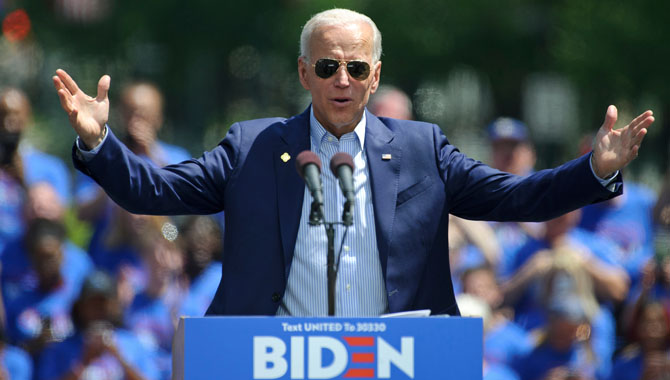
The world’s focus turned even more to the United States last November as the country voted for its next President, Joseph Biden. Though the election itself earned the lion’s share of attention, the gaming industry was eager to follow Congressional and Senate races, which would determine control of the nation’s Capitol, as well as state and local elections with potentially significant implications for individual markets.
To break down the election results, Global Gaming Expo partnered with the American Gaming Association (AGA) for a G2E Insider Live Webinar, “What’s Next: The Post-Election Landscape and Implications for Gaming.” Moderated by the AGA’s Chris Cylke, the panel methodically broke down the election’s impact at the national, state and tribal level.
At the time of the webinar on 10 December, control of the US Senate remained in the balance pending the results of the Georgia Senate runoffs in the first week of January. Even without knowing who would possess a majority in the Senate, the 2020 election offered some clear takeaways for our industry, beginning with the new President’s attitude toward gaming-related issues.
The most significant influence Biden might have over the gaming industry is his administration’s stance on the Federal Wire Act. Created in 1961, the original Wire Act prohibited all forms of interstate gambling as a shield to prevent the mob from betting on rigged sporting events. In 2011 the Department of Justice (DOJ) clarified the act, stating: “Interstate transmissions of wire communications that do not relate to a sporting event or contest fall outside the reach of the Wire Act.” This paved the way for Nevada and New Jersey to legalize online poker, and for New Jersey, Pennsylvania, West Virginia and soon Michigan to allow online casinos.
But two years ago, under President Trump’s Attorney General William Barr, the DOJ reversed the 2011 decision, arguing that the Wire Act’s prohibitions are “not uniformly limited to gambling on sporting events or contests.” That led the New Hampshire Lottery Commission to file a suit against Barr in the First District Court of Appeals seeking to vacate the most recent DOJ ruling.
Then in June 2020, a three-judge panel heard arguments on the scope of the Wire Act. A verdict is supposed to arrive in early 2021, but the untimely death of Judge Juan Torruella could complicate things if and when a ruling is delivered.
The court case could all come to nothing if Biden’s Attorney General pick decides to drop the DOJ’s position. Biden said on the campaign trail that he disagrees with the Trump administration’s reinterpretation of a more stringent Wire Act. Biden’s DOJ could also potentially ask to dismantle the Wire Act altogether.
“Joe Biden is from a gaming state, the state of Delaware, which has sports betting at three different properties,” said Todd Webster, principal at Cornerstone Government Affairs and former Chief of Staff to Delaware Senator Chris Coons. “That will inform his perspective, his outlook, and should be more receptive to the gaming industry.”
By loosening or even flat out disassembling the Wire Act, the Federal Government would be in effect granting states permission to move forward with online poker and casinos, which draw on interstate play. It would be easier for states with online gaming to share player data with another as well. While the AGA is in favor of a more relaxed Wire Act, it sees some drawbacks to the Federal Government getting overly invested in gaming regulation.
“While there’s clearly some upside potential for creating efficiencies across the industry as we do approach a more national marketplace for sports betting, there’s also some significant downside risk to inviting any kind of federal legislation that touches on gaming,” Cylke said. “I’d imagine that the posture of the industry will continue to be focused at the state level on getting sports betting authorized and to put off a big federal discussion around amendments to the Wire Act or any other federal legislation until a later date.”
The big action in the next few years is almost certainly to come at the state level, where two dozen state legislatures are set to consider a sports betting bill of some form. Phil Cox, co-founder of bipartisan government and public affairs firm 50 State, said there’s a pathway toward legalization in about half those states.
“The bottom line is that states are looking for new sources of revenue,” Cox said. “For new sources of revenue that haven't existed before, in a lot of these states it really comes down to two things: one is marijuana, and we’re seeing a lot of action on that, and two is gaming. Those are both fairly limited in scope when you're dealing with multi-billion-dollar budget gaps.
They can only get you so far.”
New York Governor Andrew Cuomo raised eyebrows in December by floating sports betting as a potential way to shore up $50bn in debt between state and local governments. Cuomo’s comments sent off a frenzy of speculation that New York could be the first of the ‘Big Four’ – Florida, California and Texas the others – to legalize online sports wagering.
The late Las Vegas Sands Corp. CEO Sheldon Adelson was keen for Texas to support casinos and sports betting. Adelson invested millions in Texas races during the 2020 election cycle to ensure the Republican Party held on to its majority in the legislature. With political victory secured, Adelson deployed an army of lobbyists to the Lonestar State in hopes of persuading lawmakers to bring full-scale gaming to a conservative market. Adelson’s efforts didn't appear to be making enough inroads, according to Cox.
“My read right now, and I’ve talked to the Governor about this, is he could potentially go along with it,” he said. “He doesn’t love it, but he could go along with it. The issue is the Lieutenant Governor, who has a lot of influence in the Senate, and is not in favor right now and will likely block it.”
In the short term, sports betting legalization faces a more realistic path in Connecticut, Massachusetts and Ohio, where lawmakers have previously come close to passing bills. The biggest wild card of the 2021 legislative sessions may be whether southern states like Georgia, Florida and Alabama inch closer to legalization. The success of Tennessee’s online sports betting market could influence lawmakers in neighboring states to take a closer look.
The 2020 election also held major implications for tribes, who will feel more empowered with Biden in the White House and Native American Deb Haaland leading the Department of Interior. “By and large Indian country supported Biden because of his extensive tribal agenda,” said Aurene Martin, president of Spirit Rock Consulting. “I think what tribes saw in Biden was a return to normalcy. They are familiar with him from the Obama administration.”
Another encouraging development is new bipartisan leadership for the US Senate Committee on Indian Affairs. Alaska Republican Senator Lisa Murkowski will head the committee with either Brian Schatz of Hawaii or Nevada’s Catherine Cortez Masto. Martin said the committee will raise support for tribal COVID-19 relief funds and bring attention to tribes’ business operations, including gaming.
“There hasn’t been a lot of activity in the tribal sphere on gaming issues in recent years,” Martin said. “I don’t know that we’re going to see a lot of change on that.”
After a historic election that saw Americans turn out to vote in record numbers, the hope among gaming leaders is that Washington will return to a more traditional way of operating.
Slim majorities in the House and Senate, and a moderate president, could do away with some of the hyper-partisanship that has defined the Government over the last dozen years.

